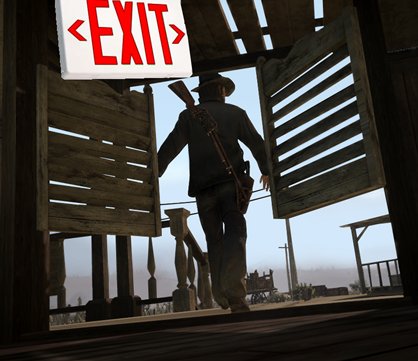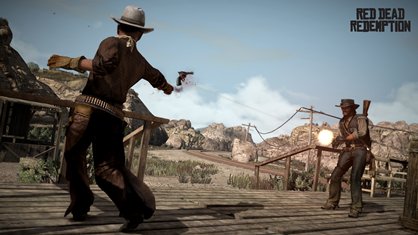Magazine writer fired after dustup with Rockstar PR
Leaked email details Rockstar's extreme sensitivity to negative coverage
According to a news.com.au story,a deputy editor for Austrailian publication Zoo Weekly has been fired after publishing an allegedly internal email from Rockstar regarding Zoo'scoverage of the upcoming Red Dead Redemption. The alleged email from Rockstar, which former deputy entertainment editor Toby McCasker posted on his Facebook, contained the following:
"This is the biggest game we've done since GTA IV, and is already receiving Game of the Year 2010 nominations from specialists all around the world," it read.
"Can you please ensure Toby's article reflects this — he needs to respect the huge achievement he's writing about here."

Above: "Well Pardner, looks like it's about time for me tobe moseyin' on over to Monster.com."
If true, the email/firing will be the latest chapter in the long running struggle between games journalists trying to protect their editorial credibility, and PR departments refusing to advertise on sites that give negative reviews to their products. It should be noted that Zoo Weekly is not strictly a games publication, it’s a men’s interest magazine a la Maxim, and the writer in question tends to favor a more casual/inflammatory writing style.
The official stance is that McCasker was fired as a result of the leaked email, not because of his negativeopinion of Red Dead Redemption/Rockstar. Even so, the damage control stance taken by the publication’s editor is telling. Responding to Kotaku, the site’s editor Paul Merrill said:
“I would like to make it clear that at no time has Rockstar EVER sought a preferential review in return for advertising. In fact no games company has ever suggested this. And Zoo would never give a positive review to a game we didn't rate in return for ad dollars.”
Sign up to the GamesRadar+ Newsletter
Weekly digests, tales from the communities you love, and more
He continues: "Toby McCasker was sacked for a number of reasons, one of which was his decision to post a private email on his Facebook page. This email was not referring to a game review. He should not be considered a credible source of information on this matter.”

Above: 2010 GOTY (I've got kids to feed!)
While it’s impossible to speculate on what relationship Mr. McCasker had with his former company, it’s somewhat disheartening to seeMerrill so quickly and assertively attempting to discredit and abandon one of his own writers. The comment also confirms the fact that the worryingly strong-armed email was, in fact real, though not referring to the game’s review.
The reality of the situation is that websites are fueled by advertising dollars, and if a company takes issue with a site they can simply choose not to spend their ad budget money there. The opposite is also true, in that a website that’s seen as nothing more than a corporate shill will alienate gamers and become unpopular. There’s a thin line between criticism and advertisement, but itincreasingly looksas ifthe only casualties in the battleare the writers themselves.
Apr 7, 2010



